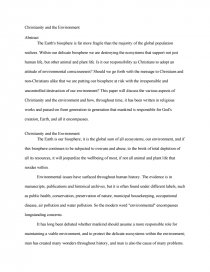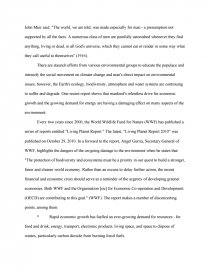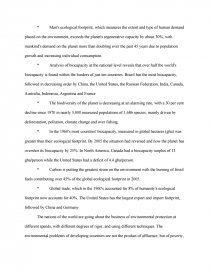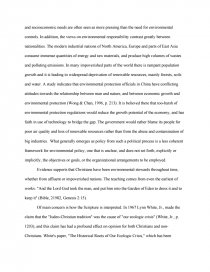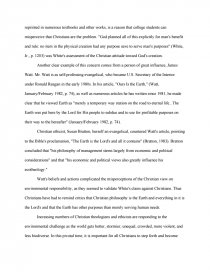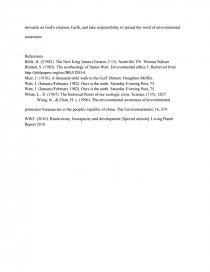Christianity and the Environment
Essay by Nicolas • October 31, 2011 • Essay • 1,590 Words (7 Pages) • 1,969 Views
Christianity and the Environment
Abstract
The Earth's biosphere is far more fragile than the majority of the global population realizes. Within our delicate biosphere we are destroying the ecosystems that support not just human life, but other animal and plant life. Is it our responsibility as Christians to adopt an attitude of environmental consciousness? Should we go forth with the message to Christians and non-Christians alike that we are putting our biosphere at risk with the irresponsible and uncontrolled destruction of our environment? This paper will discuss the various aspects of Christianity and the environment and how, throughout time, it has been written in religious works and passed-on from generation to generation that mankind is responsible for God's creation, Earth, and all it encompasses.
Christianity and the Environment
The Earth is our biosphere; it is the global sum of all ecosystems, our environment, and if this biosphere continues to be subjected to overuse and abuse, to the brink of total depletion of all its resources, it will jeopardize the wellbeing of most, if not all animal and plant life that resides within.
Environmental issues have surfaced throughout human history. The evidence is in manuscripts, publications and historical archives, but it is often found under different labels, such as public health, conservation, preservation of nature, municipal housekeeping, occupational disease, air pollution and water pollution. So the modern word "environmental" encompasses longstanding concerns.
It has long been debated whether mankind should assume a more responsible role for maintaining a viable environment, and to protect the delicate ecosystems within the environment; man has created many wonders throughout history, and man is also the cause of many problems. John Muir said: "The world, we are told, was made especially for man - a presumption not supported by all the facts. A numerous class of men are painfully astonished whenever they find anything, living or dead, in all God's universe, which they cannot eat or render in some way what they call useful to themselves" (1916).
There are staunch efforts from various environmental groups to educate the populace and intensify the social movement on climate change and man's direct impact on environmental issues; however, the Earth's ecology, biodiversity, atmosphere and water systems are continuing to suffer and degrade. One recent report shows that mankind's relentless drive for economic growth and the growing demand for energy are having a damaging effect on many aspects of the environment.
Every two years since 2000, the World Wildlife Fund for Nature (WWF) has published a series of reports entitled "Living Planet Report." The latest, "Living Planet Report 2010" was published on October 29, 2010. In a forward to the report, Angel Gurria, Secretary General of WWF, highlights the dangers of the on-going damage to the environment when he states that "The protection of biodiversity and ecosystems must be a priority in our quest to build a stronger, fairer and cleaner world economy. Rather than an excuse to delay further action, the recent financial and economic crisis should serve as a reminder of the urgency of developing greener economies. Both WWF and the Organisation [sic] for Economic Co-operation and Development (OECD) are contributing to this goal." (WWF). The report makes a number of disconcerting points, among them:
* Rapid economic growth has fuelled an ever-growing demand for resources - for food and drink, energy, transport, electronic products, living space, and space to dispose of wastes, particularly carbon dioxide from burning fossil fuels.
* Man's ecological footprint, which measures the extent and type of human demand placed on the environment, exceeds the planet's regenerative capacity by about 30%, with mankind's demand on the planet more than doubling over the past 45 years due to population growth and increasing individual consumption.
* Analysis of biocapacity at the national level reveals that over half the world's biocapacity is found within the borders of just ten countries. Brazil has the most biocapacity, followed in decreasing order by China, the United States, the Russian Federation, India, Canada, Australia, Indonesia, Argentina and France
* The biodiversity of the planet is decreasing at an alarming rate, with a 30 per cent decline since 1970 in nearly 5,000 measured populations of 1,686 species, mainly driven by deforestation, pollution, climate change and over fishing.
* In the 1960's most countries' biocapacity, measured in global hectares (gha) was greater than their ecological footprint. By 2005 the situation had reversed and now the planet has overshot its biocapacity by 25%. In North America, Canada had a biocapacity surplus of 13 gha/person while the United States had a deficit of 4.4 gha/person.
* Carbon is putting the greatest strain on the environment with the burning of fossil fuels contributing over 45% of the global ecological footprint in 2005.
* Global trade, which in the 1960's accounted for 8% of humanity's ecological footprint now accounts for 40%. The United States has the largest export and import footprint, followed by China and Germany.
The nations of the world are going about the business of environmental protection
...
...
